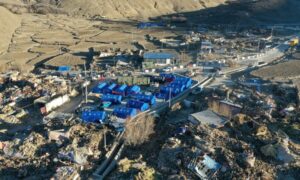Tehran has put off for now any retaliatory strike for assassination of Hamas’ political chief Ismail Haniyeh on Iranian soil, thus giving rise to apprehensions that Israel may escape retribution yet again for excesses it has been committing not just against Palestinians but also Iran, which leads what has come to be regarded as the ‘axis of resistance’ in the Middle East. This may be good news for the region in the short term, but bad for the world in the long run.
Haniyeh was assassinated in Tehran on the last day of July and Iran’s supreme leader Ayatollah Ali Khamenei had stated immediately afterwards that avenging Israel’s abhorrent action was a “duty” because he was martyred during a visit to Iran. This means a full month has passed since that statement and yet Iran has not launched any direct or indirect strike on Israel.
Lebanon-based resistance group Hezbollah has indeed carried out several attacks inside Israel in retaliation for the killing of its own leader Fuad Shukr, who was assassinated during an air strike on Beirut shortly before Haniyeh’s death, but any attack by Iran has yet to materialise. No strike has been carried out despite repeated assertions by Iranian officials that an attack would definitely take place.
British news agency Reuters then quoted three senior Iranian officials as saying that “only a ceasefire deal in Gaza stemming from hoped-for talks this week would hold Iran back from direct retaliation against Israel”. A senior security official said Iran, along with allies such as Hezbollah, would launch a direct attack if the Gaza ceasefire talks fail or it perceives Israel is dragging out negotiations.
Sources said that in case a Gaza ceasefire deal is reached then Iran could leave its decision to launch retaliatory strikes unimplemented. The sources did not say how long Iran would allow for talks to make progress before responding, according to the news agency.
The Reuters report went on to say: “The US ambassador to Turkey confirmed Washington was asking allies to help convince Iran to de-escalate tensions. Three regional government sources described conversations with Tehran to avoid escalation ahead of the Gaza ceasefire talks, due to begin either in Egypt or Qatar.”
There are several reasons why the Islamic Republic seems to be unsure about a major offensive against Israel now. One reason is obviously the tremendous pressure that has been brought to bear on Tehran by the Western governments in order to stop it from carrying out any blitz. In a world where the powerful countries, particularly Israel and the US, can literally get away with committing murders, the weaker ones don’t have the same “luxury” even as international law gives them the proverbial “right of self-defence”.
The other reason is tactical in nature. The question is: should Iran carry out a symbolic attack, like the one it launched in the aftermath of an Israeli strike on the Iranian Embassy complex in Damascus that left many military officers dead, or should it go for a far more effective operation that draws (a lot of) blood? The April attack had largely been blunted as Israel and its allies, including the US and the UK, had managed to shoot down more than 300 missiles and drones that Iran had unleashed.
The problem with the first option is that it will give the impression of a failed attack for a second time. And the problem with the second option is: what will happen afterwards? Put differently, how will Israel respond to the Iranian retaliation, particularly if it causes death and destruction on a wide scale on Israeli soil?
The last factor is surely important in the eyes of Iranians because it involves ensuring their soil is defended adequately and effectively in case Israel uses overwhelming force, or if the US intervenes in the conflict, after a successful retaliatory attack by Iran. This means the Iranian leaders have not just got to decide on how to launch an offensive operation but also a defensive one that may be needed later to defend their vast country.
On the strategic plane, the Iranian leadership also must decide whether the time is right for a direct fight with Israel. In other words, they have to decide whether or not bowing out of the current battle will ultimately enable it to win the wider war. A factor that needs to be kept in mind here is that Israeli Prime Minister Benjamin Netanyahu seems to be spoiling for a direct fight with Iran. Such a conflict will keep him in power for some time because elections are rarely held during wars.
In the meantime, Iran would not want to come across as a country that’s not bothered about the plight of Gazans. The Iranians would not want to be accused of carrying out a reckless military operation in haste that resulted in ending the hopes for a ceasefire in Gaza.
In view of the above, Iran may be justified in postponing a strike on Israel they themselves had claimed was imminent. However, the sole beneficiary from any stepping back on the part of Iran will be Netanyahu, and of course his rogue government. What’s infinitely worse, the responsibility for that decision will rest on Iran’s shoulders for a long time to come.
In case the Iranian leadership decides to scrap the idea of a retaliatory strike altogether, the Jewish state will once again be able to strut the world stage as “the untouchable” who is above international laws. The step may douse the fires burning in the Mideast right now, but would have grave consequences for rule of law across the world in future.
To be sure, the progress made by institutions like the International Court of Justice and the International Criminal Court in matters relating to the Palestinian problem may go to waste in the ultimate analysis. Similarly, all the work done on the social and mainstream media to highlight the problem from the perspective of Muslims will be rendered ineffective for the time being, which is not good for our interests.






